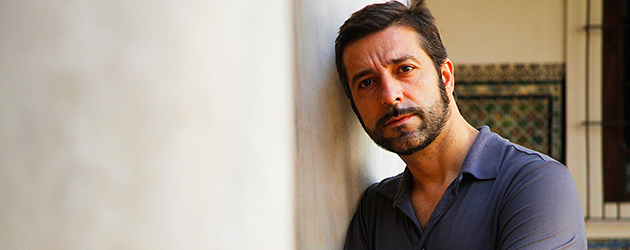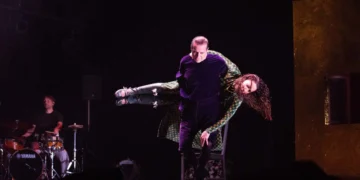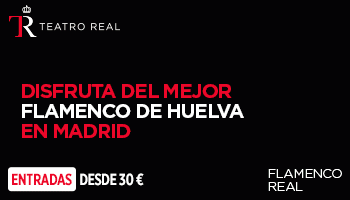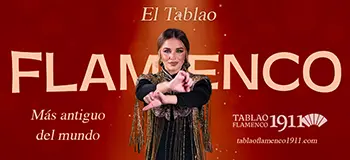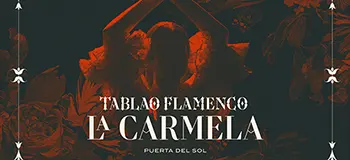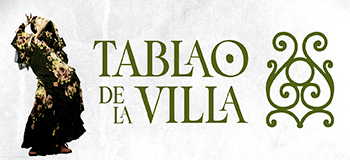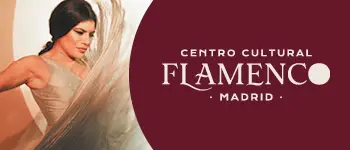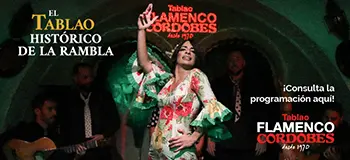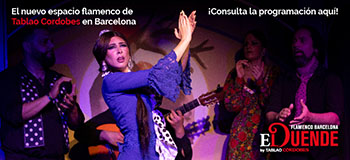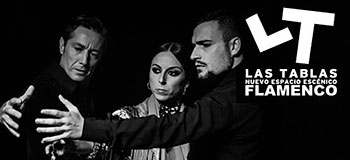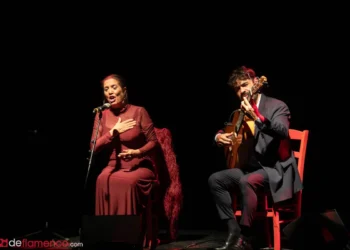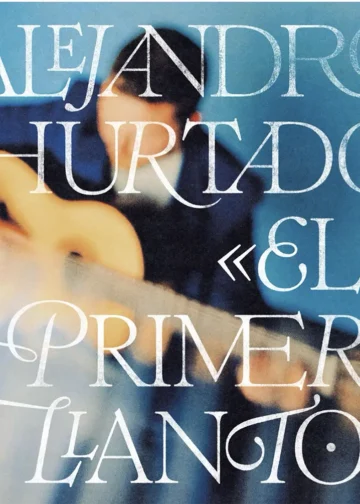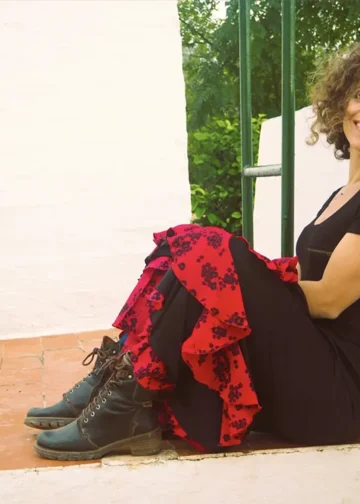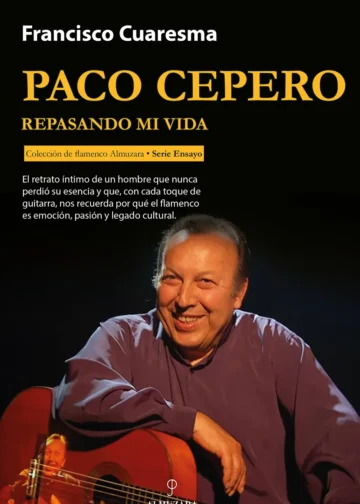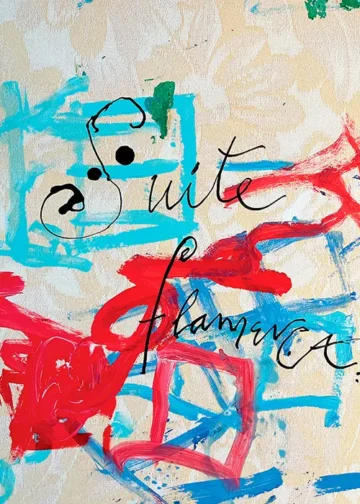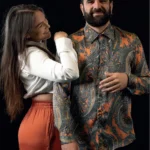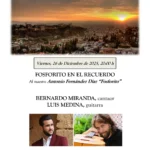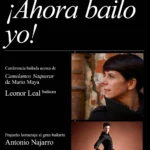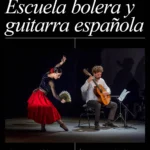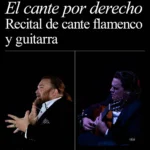Interview: Sara Arguijo
Cover photo: Victoria Hidalgo
«In flamenco everyone speaks from a stance of nostalgia for times past»
The office of Andrés Marín's dance school in the Seville neighborhood of the Alameda, is a kind of altar at which his interests are laid out in an orderly fashion on a white shelf. The works of modern art, the books of the Great Antonio and Vicente Escudero, images of dancers like Kazuo Ohno and Nijinsky, the occasional family object and a hat of Pepe Marchena's all add up to a perfect backdrop to chat in the most natural way about the references to other avant-garde cultures.
In any case, nothing seems left to chance in Marín. Projects such as «Golgota», which he performs with Bartabas, one of the biggest stars of equestrian theater, and «Yatra», with hip hop dancer Kader Attou, with whom he's touring the world, confirm this ideology of his that understands flamenco as a kind of energy «in which the important thing isn't the form, but the nucleus». For this reason, he draws as much from Dadaism, as from Charlie Chaplin's silent films, as from José de la Tomasa or Lebrijano singing.
Nevertheless, his Independence, the sobriety of his work, his architectonic dancing and cult of the bizarre, have cost him a certain amount of ostracism in a city proud of its tolerance of that which is convoluted. Fortunately, he will always have France…
-What do you find in France that's not here?
-In the first place, they have money to spend on culture. France has a very high cultural level, very good cultural managers and institutional support. And the audience is much more open-minded and well-educated. As far as contemporary dance, they have some of the best festivals on an international level, and it's a great honor for me to be given a place for our flamenco in these circuits, but cutting-edge flamenco.
«An artist has to represent his era»
-Do you feel misunderstood in Spain?
-I don't know, but people seem to think they've seen it all, and it's not so. I think you have to be more cautious. In flamenco, everyone speaks from a stance of nostalgia for times past, even forward-looking young people who were listening to rock music until the other day, suddenly they discover flamenco and lay down the law as if they were critics. That's why it's better to focus on your career and do what you want. If I'd had to go by the critics, or by what people proposed to me, Bartabas would never have noticed me, and I wouldn't be in France.
-Is your dancing better understood by flamenco people, or among modern dancers?
-I feel more understood among real flamenco people. Anyone who knows flamenco, gets my message. In any case, it's all the same to me. I do what I feel, I have my path and try to follow my intuition, not what audiences demand. Not even what the programmers demand. So far, it's served me well doing what I wanted to do, but I'm not trying to please everyone or pass myself off as a genius.
-Fair enough, you're not worried about pleasing everyone…but do you aim to provoke?
Not gratuitously, no, but my dancing is provocative without trying to be. Even with sober dark staging, my way of dancing is suspicious. Normally audiences are wondering «what am I seeing?» I guess it's not easy to come and see me, but not because I'm trying to provoke anyone. Now, if I want to put a live hen on my head because I see this in the artistic context, or dance wearing a dunce cap, I do it.
«My dancing is provocative on its own, it's suspicious; it's hard to watch myself»
-And of course, this brings labels. Which one weighs the heaviest?
-It annoys me when people want to label what is and is not flamenco. The way I see it, it's more interesting to discuss whether a work is well-done or not, whether or not it's rubbish. We're living in an era of absolute folklore, returning to the popular clichés. Art is inevitably a reflection of society, and this is what is going through a period of collective asphyxiation, of fear, of attacks on culture, and many people have been drawn to nostalgic romanticism. Dead people ought to serve as inspiration, but it makes no sense to bring them back just like that, without parallel knowledge. An artist has to represent his era, just as Picasso, Dalí or Van Gogh did. They've got us anesthetized, and I ask myself, where's the creative element?…where's the questioning? Fortunately we're coming out of this.
-This return to romanticism you talk about, is it more prevalent in flamenco?
-Perhaps, because it's the foreigners who are taking over flamenco, filling the theaters. And the problem is this audience, when they get to the theater what they want to see is popular flamenco, not the traditional kind, which is something else. I have a dance school, and only a small handful of people are interested in the tradition, most are just after the superficial.
-In this sense, now that they've awarded the Premio Max de las Artes Escénicas to the Bienal de Sevilla, and comparing it with other international festivals, what do you think about this?
-I think the Bienal is an important series, but this last one seemed different from the others, it was more conservative. I believe in a Bienal in which there are some popular elements, but which also has room for the avant-garde. Furthermore, it's complicated because many of the shows presented, are never seen again, and I don't think the city is involved.
-What kind of flamenco is Andrés Marín interested in?
-For me, flamenco is a personal prayer, the only way I have to channel my energy. In this sense, I'm interested in everything that is suggestive, freedom of expression, and works that are worthwhile. Like I said before, I want no part of quaint corny flamenco worthy of a school show. It's not even real. The traditions can be revised time and again from the perspective of the avant-garde without losing sight of the identity. That is my permanent goal. To take a new reading.
«My quest is to put a new spin on tradition, without losing the identity, but avoiding anything corny»
-In this sense, do you consider yourself a champion of the bizarre?
-This is very interesting for me, because I feel flamenco is a group of codes that can be managed in any number of ways. There is an expansive way of dancing, towards the exterior, which connects easily with the audience, but there is also another kind of content that is denser and in which I find great beauty, although it is dark. It's true that Seville is very baroque, and appreciates flashy dancing. I, however, prefer the sober side of Seville.
-As a dance teacher in your studio, what message would you like to communicate to your students?
-Above all, flamenco values, which must always be above our own egos, the name or the brand. It's important that whoever comes here, know the tradition and respect the legacy of the elders, because without that, all that's left is superfluous and lacks depth.
Descubre más desde Revista DeFlamenco.com
Suscríbete y recibe las últimas entradas en tu correo electrónico.


